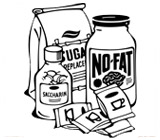 If you’re watching your weight or living with diabetes, you probably know the advantages of satisfying your sweet tooth with sugar substitutes rather than the real deal. Did you know that sugar substitutes can also help reduce your risk for tooth decay? One particular sugar stand-in, xylitol, might actually promote oral health!
If you’re watching your weight or living with diabetes, you probably know the advantages of satisfying your sweet tooth with sugar substitutes rather than the real deal. Did you know that sugar substitutes can also help reduce your risk for tooth decay? One particular sugar stand-in, xylitol, might actually promote oral health!
Sugar substitutes are food additives that mimic the taste of sugar but supply little to no food energy (nutrition) and therefore zero or few calories. This is because they generally cannot be digested and absorbed by the body. They pass through largely unused and have little to no effect on blood sugar levels. Oral bacteria aren’t able to process sugar substitutes either. They get significant nutrition from “real” sugars that pass through the mouth — generating tooth-eroding, cavity-promoting acids in the digestive process. A diet of artificial sweeteners eliminates or significantly curtails the acidity problem and essentially starves the “bad” bacteria so more tooth-friendly bacteria can crowd them out.
The Food and Drug Administration (FDA) has approved 6 artificial sweeteners (synthetically produced zero-calorie sugar substitutes) for use in the U.S.:
- Acesulfame K — Sunett®, Sweet One®
- Aspartame — Equal, NutraSweet
- Neotame — a modified form of aspartame
- Saccharin — Sweet’N Low, Sugar Twin
- Sucralose — Splenda
- Rebaudioside A — Truvia, Sun Crystals, Stevia in the Raw
There also are naturally occurring low-calorie sugar alcohols (polyols), used alone or in combination with an artificial sweetener. They are incompletely digested and absorbed slowly so the amount of calories they generate is minimal. Commonly used polyols include erythritol, maltitol, mannitol, sorbitol and xylitol. Research suggests that xylitol may help prevent tooth decay and promote oral health by reducing levels of the major acid-producing bacteria in the mouth, Streptococcus mutans.
Despite their virtues, there is debate regarding the safety of sugar substitutes — synthetic ones in particular. Currently the focus is on how they may affect taste perception, metabolism, and eating habits. From a dental perspective, however, the overall benefits for using xylitol are pretty clear!
If you would like more information about nutrition and oral health, please contact us or schedule an appointment for a consultation. You can also learn more about this topic by reading the Dear Doctor magazine article “Artificial Sweeteners.”



